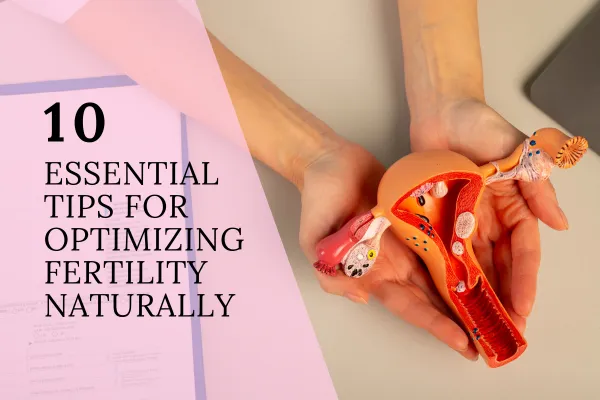
10 Essential Tips for Optimizing Fertility Naturally
1. The Importance of Sleep for Fertility
Getting enough quality sleep is crucial for fertility. Sleep affects the production of hormones like melatonin and cortisol, which in turn influence reproductive hormones. Poor sleep can lead to irregular menstrual cycles and reduced sperm quality. Aim for 7-9 hours of sleep per night, and create a bedtime routine to help your body wind down. Avoid screens an hour before bed to reduce blue light exposure, which can interfere with melatonin production. Consider using a sleep tracker to monitor your sleep patterns and identify areas for improvement. Prioritizing sleep can help optimize your fertility and overall health.
2. Reducing Toxins for a Healthy Pregnancy
Toxins in our environment can negatively impact fertility and pregnancy outcomes. Common sources include household cleaners, personal care products, and processed foods. Opt for natural cleaning products, avoid plastics containing BPA, and choose organic foods when possible. Additionally, detoxify your home by improving ventilation and using air purifiers. Drinking plenty of water and eating a diet rich in antioxidants can also help your body eliminate toxins. Reducing your exposure to harmful chemicals supports your reproductive health and enhances your chances of a healthy pregnancy.
3. Balancing Hormones Naturally
Hormonal imbalances can hinder fertility, but there are natural ways to support hormone health. Eating a balanced diet rich in whole foods, healthy fats, and lean proteins can promote hormonal balance. Regular exercise, managing stress, and getting adequate sleep are also essential. Supplements like omega-3 fatty acids, vitamin D, and magnesium can be beneficial, but it's important to consult with a healthcare provider before starting any new regimen. Tracking your menstrual cycle can provide insights into your hormonal health and help identify any irregularities.
4. The Power of Positive Mindset
A positive mindset can significantly impact your fertility journey. Stress and anxiety can interfere with reproductive hormones and ovulation. Incorporate stress-reducing practices like meditation, yoga, or deep-breathing exercises into your daily routine. Surround yourself with supportive people who uplift and encourage you. Practicing gratitude and focusing on what you can control can also help shift your mindset. Remember, maintaining a positive outlook can improve your overall well-being and enhance your fertility.
5. Nutrition for Fertility
What you eat plays a crucial role in your fertility. A diet rich in fruits, vegetables, whole grains, lean proteins, and healthy fats can support reproductive health. Focus on foods high in antioxidants, like berries and leafy greens, to protect your eggs and sperm from damage. Include sources of folic acid, such as spinach and legumes, to support fetal development. Limiting processed foods and sugars can also help maintain a healthy weight, which is important for fertility. Eating a nutrient-dense diet can boost your chances of conception and a healthy pregnancy.
6. Addressing Physical Barriers to Pregnancy
Physical issues like blocked fallopian tubes, fibroids, or endometriosis can affect fertility. It's important to get a thorough medical evaluation to identify any potential barriers. Treatments can range from medication to surgery, depending on the condition. In some cases, lifestyle changes like losing weight or managing stress can also improve outcomes. Working with a healthcare provider to address these physical barriers can enhance your chances of getting and staying pregnant.
7. The Role of Holistic Medicine in Fertility
Holistic medicine can complement conventional treatments for fertility. Acupuncture, for example, has been shown to improve blood flow to the reproductive organs and reduce stress. Herbal medicine can also support hormonal balance and overall health. Always consult with a healthcare provider before starting any new treatment to ensure it’s safe and appropriate for your situation. Integrating holistic approaches with conventional medicine can provide a comprehensive plan to optimize your fertility.
8. The Impact of Toxins on Fertility
Exposure to environmental toxins can disrupt hormone balance and reduce fertility. Common culprits include pesticides, heavy metals, and endocrine disruptors found in plastics. Minimize exposure by choosing organic produce, using glass containers instead of plastic, and avoiding processed foods. Regular detox practices, like drinking plenty of water and eating fiber-rich foods, can help your body eliminate toxins. Reducing your toxic load can support your reproductive health and improve your chances of conceiving.
9. Hormones and Fertility: What You Need to Know
Hormones play a critical role in regulating your reproductive system. Imbalances can lead to issues like irregular periods, polycystic ovary syndrome (PCOS), and low sperm count. Maintaining a healthy lifestyle, including a balanced diet, regular exercise, and stress management, can support hormonal health. Regular check-ups with a healthcare provider can help monitor and address any imbalances. Understanding the role of hormones in fertility can empower you to take proactive steps toward optimizing your reproductive health.
10. Mindset and Fertility: Staying Positive on Your Journey
Your mindset can influence your fertility journey more than you might realize. High levels of stress and negative thinking can impact your body’s ability to conceive. Incorporating relaxation techniques like meditation, journaling, and connecting with supportive friends or a counselor can make a big difference. Visualizing positive outcomes and focusing on self-care can help reduce stress and promote a healthy, fertile environment in your body. Keeping a positive mindset is a powerful tool in your fertility journey.
